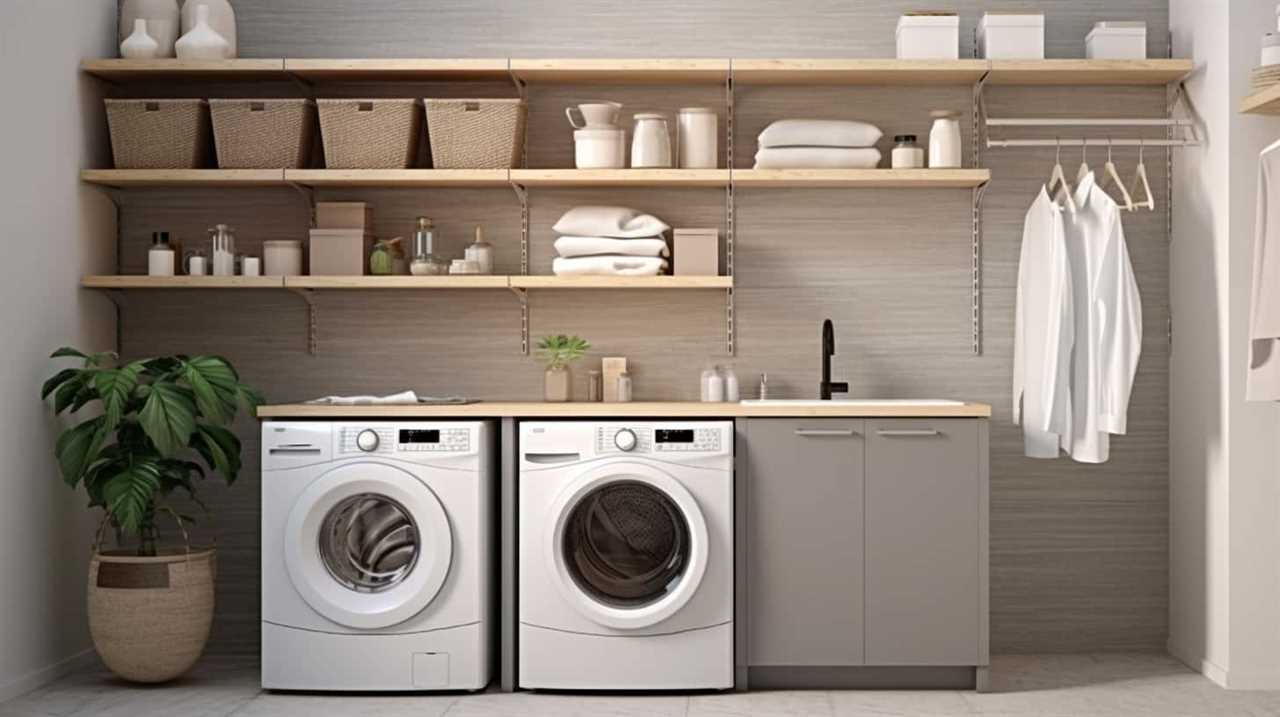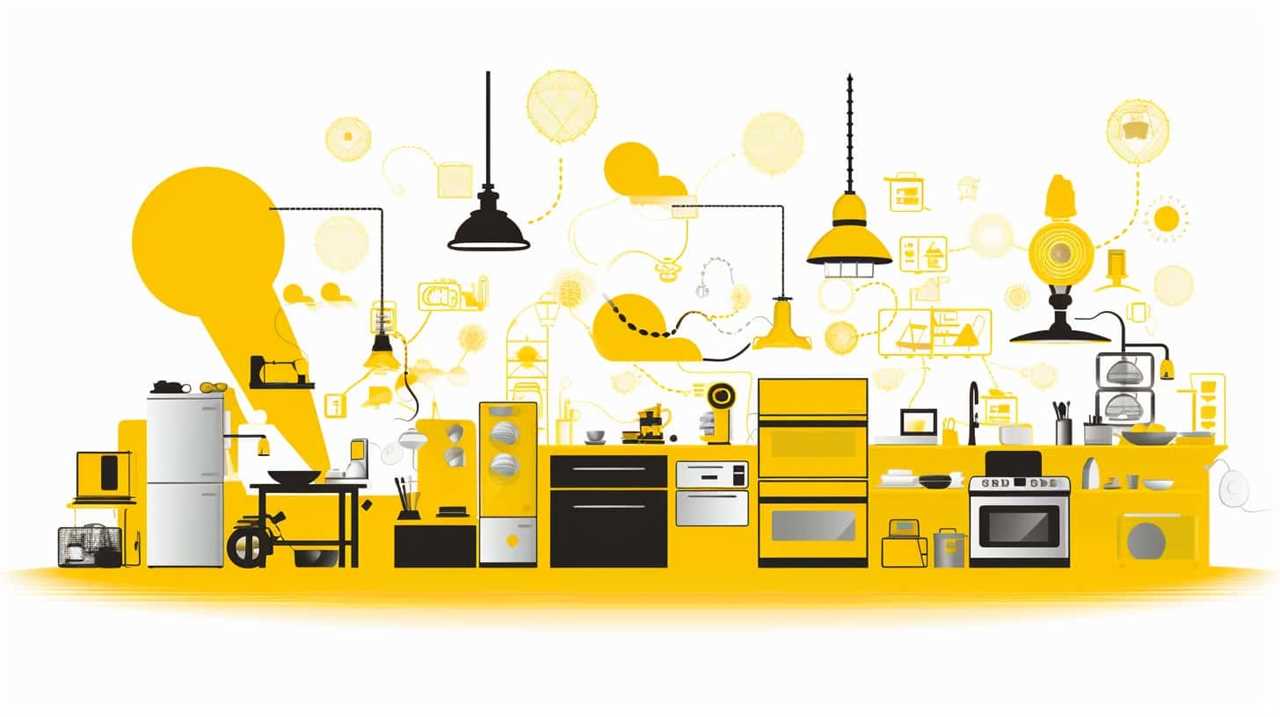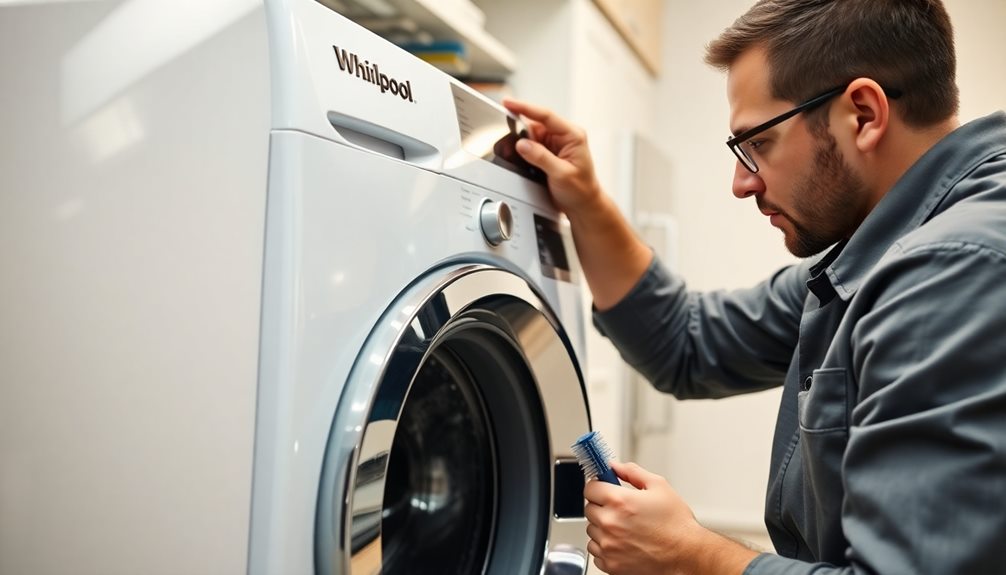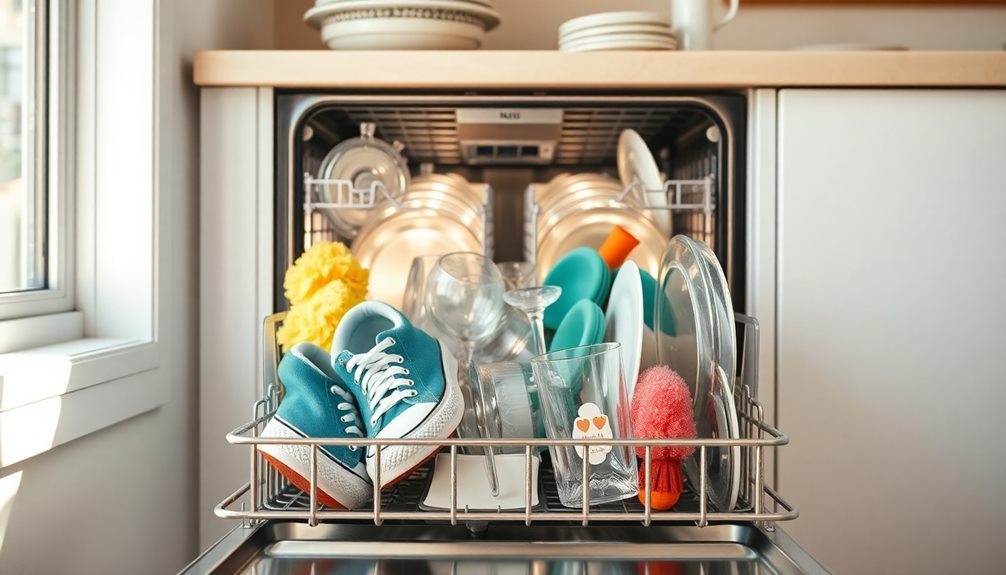Ever thought about how energy-efficient appliances can impact the environment? Let me tell you, it’s a total game-changer!
These appliances, which are designed to use less energy while still providing the same level of performance, have a significant positive effect on our planet. By reducing our energy consumption, we can decrease greenhouse gas emissions, conserve natural resources, minimize air pollution, prevent water contamination, and promote sustainable development.
Not to mention the improvement in indoor air quality and enhancement of public health that comes along with it. And the best part? Energy efficiency also brings economic benefits.
So, join us as we explore the incredible environmental impact of energy-efficient appliances and how they contribute to a greener and more sustainable future.

Key Takeaways
- Energy-efficient appliances significantly reduce energy consumption, leading to lower utility bills and allowing for the allocation of energy savings to other areas of life.
- The use of energy-efficient appliances contributes to a decrease in greenhouse gas emissions, helping to mitigate climate change and reduce the carbon footprint.
- Energy-efficient appliances have economic benefits for consumers, including cost savings, increased disposable income, and job opportunities in manufacturing and installation.
- Energy-efficient appliances promote sustainable practices, such as recycling and waste reduction, and help conserve natural resources by minimizing overall resource demand and reducing reliance on fossil fuels.
Reduction in Energy Consumption
We frequently find that energy-efficient appliances reduce our energy consumption significantly. By using appliances that are designed to operate with less energy, we can greatly decrease the amount of electricity we consume in our homes. This reduction in energy consumption leads to a variety of benefits, including reduced utility bills and increased energy savings.
When we switch to energy-efficient appliances, we can expect to see a noticeable decrease in our monthly utility bills. These appliances are designed to use less energy while still providing the same level of performance. This means that we can enjoy the same conveniences and functionality without having to pay exorbitant amounts for electricity. The savings can add up over time, allowing us to allocate our resources to other areas of our lives.
Not only do energy-efficient appliances result in reduced utility bills, but they also contribute to increased energy savings. By consuming less electricity, we’re reducing the demand for energy from power plants. This, in turn, helps to conserve natural resources and reduce greenhouse gas emissions. It’s a holistic approach to energy consumption that benefits not only our wallets but also the environment.
Decrease in Greenhouse Gas Emissions
When it comes to energy-efficient appliances, one of the key benefits is the decrease in greenhouse gas emissions. By reducing energy consumption, these appliances contribute to positive climate change impact and help lower our carbon footprint.

The use of energy-efficient appliances not only saves us money on energy bills but also plays a crucial role in mitigating the harmful effects of greenhouse gas emissions on our environment.
Positive Climate Change Impact
Energy-efficient appliances have a significant positive impact on climate change by reducing greenhouse gas emissions. This not only helps mitigate the effects of global warming but also brings about several other benefits.
- Positive Economic Impact:
- Energy-efficient appliances can lead to significant cost savings for consumers. By reducing energy consumption, households can expect lower utility bills, resulting in increased disposable income.
- The manufacturing and installation of energy-efficient appliances create job opportunities and stimulate economic growth. This contributes to a thriving economy and improved living standards.
- Energy Savings Incentives:
- Many governments and utility companies offer incentives to encourage the adoption of energy-efficient appliances. These incentives can range from tax credits and rebates to discounted prices and low-interest loans.
- By taking advantage of these incentives, consumers can’t only save money but also contribute to a cleaner environment by reducing greenhouse gas emissions.
Lower Carbon Footprint
By reducing greenhouse gas emissions, energy-efficient appliances have a direct impact on our carbon footprint. These appliances are designed to consume less energy, resulting in lower energy bills for consumers. The improved energy efficiency of these appliances means that they require less electricity to operate, reducing the demand for fossil fuels and the associated emissions of carbon dioxide and other greenhouse gases.
This decrease in greenhouse gas emissions helps to mitigate climate change and its detrimental effects on the environment. Studies have shown that energy-efficient appliances can significantly reduce carbon emissions compared to their less efficient counterparts. For example, a study conducted by the American Council for an Energy-Efficient Economy found that energy-efficient refrigerators emit 40% less carbon dioxide than standard models.

This evidence highlights the importance of investing in energy-efficient appliances to reduce our carbon footprint and contribute to a more sustainable future.
Conservation of Natural Resources
When it comes to the conservation of natural resources, there are several key points to consider.
First, we need to find solutions for resource depletion by implementing sustainable practices such as recycling and reducing waste.
Second, promoting sustainable consumption practices can help minimize the overall demand for natural resources.

Lastly, investing in alternative energy sources like solar and wind power can reduce our reliance on fossil fuels and protect our natural resources for future generations.
Resource Depletion Solutions
We can mitigate resource depletion by actively preserving and conserving natural resources. Implementing resource conservation practices and promoting sustainable manufacturing can help us reduce the negative impact on our environment.
Here are two sub-lists that highlight the importance of resource depletion solutions:
- Conservation of natural resources:
- By practicing responsible consumption, we can ensure that resources aren’t wasted and used efficiently.
- Adopting recycling and reusing methods can help minimize the extraction and depletion of natural resources.
- Sustainable manufacturing:
- Encouraging industries to adopt sustainable manufacturing processes can reduce the consumption of raw materials and minimize waste.
- Investing in research and development of eco-friendly technologies can lead to the production of energy-efficient and environmentally friendly products.
Sustainable Consumption Practices
One important aspect of sustainable consumption practices is our responsible utilization of natural resources. To achieve this, it’s crucial to adopt sustainable production methods and circular economy practices.

Sustainable production methods focus on minimizing waste, reducing energy consumption, and using environmentally friendly materials throughout the manufacturing process. This includes practices such as recycling, reusing materials, and implementing renewable energy sources.
Circular economy practices aim to reduce resource depletion by promoting the reuse, repair, and recycling of products, rather than their disposal. By implementing these practices, we can minimize the negative impact on natural resources and contribute to a more sustainable future.
Transitioning into the subsequent section about alternative energy sources, it’s important to consider how these sources can further contribute to sustainable consumption practices.
Alternative Energy Sources
To conserve natural resources, it’s essential to explore alternative energy sources that can reduce our environmental impact. By shifting towards renewable energy technologies, we can significantly decrease our reliance on fossil fuels and mitigate the harmful effects of climate change. Here are two reasons why alternative energy sources are crucial for conservation:

- Reduced carbon emissions: Alternative energy sources such as solar, wind, and hydroelectric power generate electricity without releasing greenhouse gases. This helps combat climate change by minimizing the amount of carbon dioxide being released into the atmosphere.
- Preservation of finite resources: Fossil fuels, like coal and oil, are finite resources that will eventually run out. By embracing alternative energy sources, we can conserve these limited resources for future generations and prevent the depletion of natural reserves.
Minimization of Air Pollution
The minimization of air pollution is a crucial aspect to consider when examining the environmental impact of energy-efficient appliances. Energy-efficient appliances not only help conserve energy and lower utility bills but also contribute to improving air quality, which has significant health benefits for individuals and communities.
One of the main ways energy-efficient appliances minimize air pollution is by reducing the emission of greenhouse gases. Traditional appliances, such as refrigerators and air conditioners, consume a significant amount of electricity, which is often generated by burning fossil fuels. These fossil fuel combustion processes release carbon dioxide and other pollutants into the atmosphere, contributing to climate change and poor air quality. In contrast, energy-efficient appliances use less energy to perform the same tasks, resulting in reduced energy consumption and fewer greenhouse gas emissions.
Moreover, energy-efficient appliances often incorporate advanced technologies that further minimize air pollution. For example, energy-efficient HVAC systems can remove particulate matter and allergens from the air, improving indoor air quality and reducing the risk of respiratory issues. Additionally, appliances with energy-saving modes and programmable settings allow users to optimize their energy usage, reducing the overall demand for electricity and subsequently lowering the emission of pollutants from power plants.
By choosing energy-efficient appliances, individuals can actively contribute to air quality improvement and experience the associated health benefits. Improved air quality reduces the risk of respiratory diseases, allergies, and other health conditions caused by exposure to pollutants. Furthermore, reduced emissions of greenhouse gases help mitigate climate change, which has wide-ranging health impacts.

Prevention of Water Contamination
In addition to minimizing air pollution, energy-efficient appliances also contribute to the prevention of water contamination through their efficient use of resources and advanced technologies. This is crucial because preventing water contamination is vital for the health and well-being of both humans and the environment.
Here are some ways in which energy-efficient appliances are helping in the prevention of water contamination:
- Water Conservation Strategies:
- Efficient Use of Water: Energy-efficient appliances, such as dishwashers and washing machines, are designed to use less water while still maintaining high performance. This not only saves water but also reduces the amount of wastewater generated, minimizing the risk of water contamination.
- Smart Water Management: Many energy-efficient appliances come equipped with smart technologies that can monitor and optimize water usage. For example, smart irrigation systems can adjust watering schedules based on weather conditions, soil moisture levels, and plant needs, ensuring water is used efficiently and preventing excess runoff that can carry contaminants into water bodies.
Mitigation of Climate Change
When it comes to mitigating climate change, one of the most important factors to consider is the use of renewable energy sources. By shifting away from fossil fuels and embracing renewable sources like solar, wind, and hydropower, we can significantly reduce greenhouse gas emissions.
These sources of energy are clean, sustainable, and have a much smaller carbon footprint compared to traditional forms of energy production. By investing in and promoting the use of renewable energy, we can make a significant impact in mitigating climate change and creating a more sustainable future.

Renewable Energy Sources
We actively contribute to mitigating climate change by harnessing renewable energy sources. By integrating renewable energy into our power systems, we reduce reliance on fossil fuels and their associated greenhouse gas emissions. This transition to renewable energy not only helps combat climate change, but also brings multiple benefits to our environment and society:
- Reduced air pollution: Renewable energy sources such as solar and wind produce clean energy, eliminating harmful emissions that contribute to air pollution and respiratory diseases.
- Conservation of natural resources: Unlike fossil fuels, renewable energy sources are abundant and inexhaustible, preserving our finite resources for future generations.
To ensure a continuous and reliable power supply, energy storage solutions are being developed alongside renewable energy integration. These storage technologies, such as batteries and pumped hydro storage, allow surplus energy to be stored and used when renewable sources aren’t available.
Transitioning to renewable energy is a vital step towards mitigating climate change and creating a sustainable future.
Now, let’s explore the next aspect: greenhouse gas emissions.

Greenhouse Gas Emissions
To address the mitigation of climate change, our focus turns to reducing greenhouse gas emissions through energy-efficient appliances.
Greenhouse gas reduction is crucial in combating climate change, and energy conservation plays a significant role in achieving this goal. Energy-efficient appliances are designed to minimize energy consumption while maximizing performance, resulting in lower greenhouse gas emissions.
By utilizing advanced technologies, such as improved insulation, efficient motors, and smart controls, these appliances can significantly reduce the amount of energy required for their operation. This, in turn, leads to a decrease in the burning of fossil fuels and the release of greenhouse gases into the atmosphere.
Through the widespread adoption of energy-efficient appliances, we can make significant strides in reducing greenhouse gas emissions and combating climate change.

Transitioning to the subsequent section about the ‘preservation of ecosystems’, it’s important to recognize that greenhouse gas reduction is closely linked to the overall health and sustainability of our planet’s ecosystems.
Preservation of Ecosystems
One major benefit of energy-efficient appliances is their significant contribution to the preservation of ecosystems. By reducing the consumption of energy, these appliances play a crucial role in mitigating the negative impacts of human activities on the environment.
Here are two key ways in which energy-efficient appliances help in the preservation of ecosystems:
- Preservation of Biodiversity:
Energy-efficient appliances help to conserve ecosystems by reducing the need for resource extraction. When we use less energy, we decrease the demand for fossil fuels, which in turn reduces the need for mining and drilling operations that can harm sensitive habitats. By minimizing the destruction of natural areas, energy-efficient appliances contribute to the preservation of biodiversity, allowing plants and animals to thrive in their natural habitats. - Ecosystem Conservation:
Energy-efficient appliances also have a positive impact on the conservation of ecosystems. By reducing greenhouse gas emissions, these appliances help to mitigate climate change, which is a major threat to ecosystems worldwide. Climate change can disrupt ecosystems, leading to changes in temperature, precipitation patterns, and sea levels. By reducing our carbon footprint through the use of energy-efficient appliances, we can help protect ecosystems from the harmful effects of climate change.
Reduction in Waste Generation
By promoting more sustainable consumption practices, energy-efficient appliances contribute to a decrease in waste generation. This reduction in waste is achieved through various waste management solutions and recycling initiatives. Energy-efficient appliances are designed to be more durable and have longer lifespans compared to their conventional counterparts. This means that they’re less likely to be disposed of and end up in landfills, reducing the amount of waste generated.

Additionally, energy-efficient appliances are often made from materials that can be recycled, making it easier to recover valuable resources and reduce the need for raw materials extraction.
Furthermore, energy-efficient appliances are often designed with a focus on reducing packaging waste. Manufacturers are increasingly using eco-friendly packaging materials that can be easily recycled or composted. Additionally, many energy-efficient appliances are shipped with minimal packaging, reducing the amount of waste that needs to be disposed of by the consumer.
Incorporating waste management solutions and recycling initiatives into the design and production of energy-efficient appliances not only helps reduce waste generation but also promotes a more sustainable approach to consumption. By minimizing waste and optimizing resource use, energy-efficient appliances contribute to the promotion of sustainable development.
Promotion of Sustainable Development
Energy-efficient appliances play a significant role in fostering sustainable development by significantly reducing energy consumption and carbon emissions. This promotion of sustainable development has far-reaching benefits that go beyond just saving energy and reducing pollution.

Here are two important ways in which energy-efficient appliances contribute to the promotion of sustainable development:
- Promotion of Renewable Energy:
- By reducing energy consumption, energy-efficient appliances help decrease the demand for fossil fuels, which are finite and contribute to climate change.
- This reduction in energy demand creates an opportunity for the increased use of renewable energy sources such as solar and wind power.
- Sustainable Urban Planning:
- Energy-efficient appliances play a crucial role in sustainable urban planning by reducing the strain on energy infrastructure in cities.
- This reduction in energy demand can lead to more efficient use of resources and better management of energy supply, promoting sustainable and resilient cities.
Improvement in Indoor Air Quality
The promotion of sustainable development through energy-efficient appliances extends to the improvement of indoor air quality. By using appliances that are designed to be energy-efficient, we not only reduce our carbon footprint but also enhance the air we breathe inside our homes. One of the key ways in which energy-efficient appliances contribute to improved indoor air quality is through improved ventilation.
| Improved Ventilation | Health Benefits | Energy Efficiency |
|---|---|---|
| Proper airflow | Reduced allergies and respiratory issues | Lower energy consumption |
| Removal of pollutants | Improved sleep quality | Cost savings |
| Reduced moisture | Enhanced cognitive function | Environmental preservation |
| Elimination of odors | Increased productivity and well-being | Reduced greenhouse gas emissions |
Improved ventilation ensures that fresh air is circulated throughout the living space, while also removing pollutants, moisture, and unpleasant odors. This not only creates a more pleasant environment to live in but also reduces the risk of allergies, respiratory issues, and other health problems associated with poor indoor air quality.
In addition to the health benefits, energy-efficient appliances also contribute to lower energy consumption, resulting in cost savings for homeowners. By reducing greenhouse gas emissions and preserving the environment, these appliances align with the principles of sustainability and help create a healthier planet for future generations.

Enhancement of Public Health
Our investment in energy-efficient appliances extends to enhancing public health by improving indoor air quality. By reducing the emission of pollutants and harmful chemicals, these appliances contribute to a healthier living environment. This not only benefits individuals and families but also has broader implications for public health awareness and community involvement.
Here are two key ways in which energy-efficient appliances enhance public health:
- Reduced exposure to harmful pollutants: Energy-efficient appliances, such as air purifiers and HVAC systems, are designed to minimize the release of indoor air pollutants. These pollutants, including volatile organic compounds (VOCs), mold spores, and allergens, can have detrimental effects on respiratory health. By utilizing advanced filtration systems and minimizing the use of toxic materials, energy-efficient appliances help create cleaner indoor air, reducing the risk of respiratory diseases and allergies.
- Promotion of community involvement: The adoption of energy-efficient appliances encourages community engagement and collaboration. Public health initiatives often focus on raising awareness about the importance of energy efficiency and its impact on public health. By educating individuals and communities about the benefits of energy-efficient appliances, we can empower them to make informed choices that positively impact their health and the environment. This collective effort can lead to a healthier, more sustainable future for all.
Economic Benefits of Energy Efficiency
Investing in energy-efficient appliances not only enhances public health but also frequently leads to significant economic benefits. The economic growth generated by energy efficiency can be observed in various sectors.
First and foremost, energy savings achieved through the use of efficient appliances can result in lower utility bills for consumers. This means that households and businesses can allocate more of their income towards other expenses or investments, stimulating economic activity.

Additionally, the demand for energy-efficient appliances creates job opportunities in manufacturing, installation, and maintenance. According to a report by the International Renewable Energy Agency (IRENA), the global transition to energy efficiency could create up to 6 million jobs by 2050.
Moreover, the economic benefits of energy efficiency extend beyond immediate cost savings. By reducing energy consumption, energy-efficient appliances contribute to a more sustainable and resilient energy system. This reduces the reliance on fossil fuels and decreases the vulnerability of economies to fluctuations in energy prices.
Additionally, energy efficiency measures can contribute to a reduction in greenhouse gas emissions, leading to potential savings in climate change mitigation costs. According to a study by the American Council for an Energy-Efficient Economy (ACEEE), energy efficiency investments in the United States alone have the potential to generate net savings of $2 trillion by 2050.
Frequently Asked Questions
Are There Any Downsides to Using Energy-Efficient Appliances?
Negative effects and potential drawbacks may arise from using energy-efficient appliances. While these appliances are designed to reduce energy consumption and lower utility bills, they often come with a higher upfront cost.

Additionally, the manufacturing process of these appliances can have negative environmental impacts due to the extraction of raw materials and the energy-intensive production methods.
It’s important to consider these factors alongside the benefits of energy efficiency when making purchasing decisions.
How Do Energy-Efficient Appliances Contribute to Reducing Waste Generation?
Energy-efficient appliances play a crucial role in reducing waste generation and minimizing pollution. By using less energy to perform the same tasks, these appliances help decrease the demand for fossil fuels and lower greenhouse gas emissions.
This reduction in energy consumption also translates into a decrease in the amount of waste generated and sent to landfills. Additionally, energy-efficient appliances often come with features such as water-saving options, further contributing to waste reduction.

What Role Do Energy-Efficient Appliances Play in Promoting Sustainable Development?
Energy-efficient appliances play a crucial role in promoting sustainable development. They not only help in promoting green living but also provide significant economic benefits.
By reducing energy consumption, these appliances minimize greenhouse gas emissions and contribute to mitigating climate change. Moreover, they help in conserving natural resources and reducing pollution.
With their advanced technologies and innovative designs, energy-efficient appliances are paving the way for a more sustainable future. Their widespread adoption is essential for achieving a greener and more sustainable society.
Can Energy-Efficient Appliances Help Improve the Quality of Indoor Air?
Improving ventilation and reducing pollutants are two key benefits of energy-efficient appliances. By using these appliances, we can enhance the quality of indoor air.

Energy-efficient appliances are designed to minimize the release of harmful pollutants, such as volatile organic compounds and carbon monoxide. Additionally, they often have improved ventilation systems that help circulate fresh air and remove contaminants.
This holistic approach to indoor air quality ensures a healthier and more sustainable living environment for all.
Are There Any Government Incentives or Programs to Encourage the Use of Energy-Efficient Appliances?
There are numerous government incentives and programs available to encourage the use of energy-efficient appliances. These initiatives aim to promote sustainability and reduce energy consumption.
From tax credits and rebates to funding for research and development, the government is actively supporting the adoption of energy-saving technologies. These incentives not only benefit the environment by reducing greenhouse gas emissions, but also provide financial incentives for consumers to invest in energy-efficient appliances.

Ultimately, these incentives contribute to a more sustainable future.
Conclusion
In conclusion, energy-efficient appliances have a significant positive impact on the environment.
By reducing energy consumption, decreasing greenhouse gas emissions, conserving natural resources, and minimizing air pollution, these appliances contribute to a more sustainable future.
Additionally, energy-efficient appliances also help prevent water contamination, promote sustainable development, and improve indoor air quality.

Furthermore, they have the potential to enhance public health and provide economic benefits.
Overall, investing in energy efficiency now can lead to greater benefits for both the planet and our wallets in the long run.









